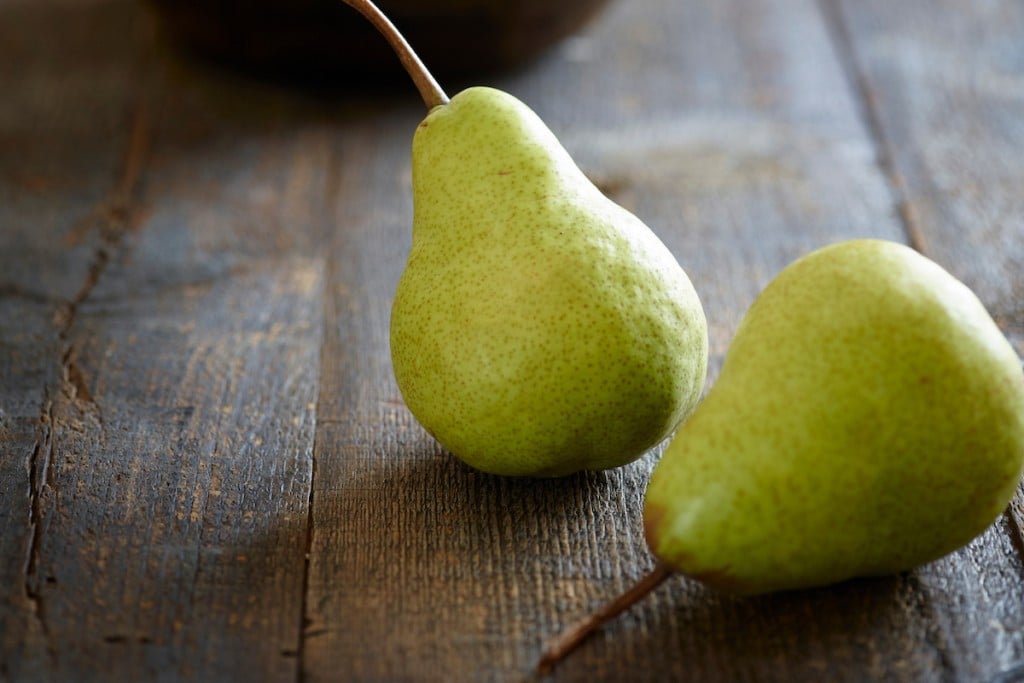The Peerless Pear
Homer called this familiar fruit “the gift of the gods.” Apparently the deities knew their nutrition.

To appreciate a food, it’s helpful to imagine if it didn’t exist, so let’s conjure up for a moment a world without pears. Certain Cezanne still-lifes would show only an empty plate. We’d all miss out on nutrients, a moistly crunchy texture and a mildly sweet taste. And that well-known 12-day holiday song would have to end each verse with “and a partridge in an undisclosed location.”
But never fear—the good old pear isn’t going anywhere. (Nor is its homonym-happy name: pluck two and you’ve got a pair, peel the skin and you’ve begun to pare.) Known for broad bottoms and narrow tops (though some are rounder), the fibrous-centered genus Pyrus grows on trees, but doesn’t ripen well there. (It gets gritty.) Its skin is usually greenish-to-gold, though some varieties are pinkish—indeed, there are roughly 3,000 known kinds, including Bartlett, Red Bartlett, Red Anjou, Green Anjou, Bosc, Comice, Concorde and Starkrimson.
The cultivation of pears is believed to date back to 5,000 B.C. in China. In those days, so the story goes, a diplomat named Feng Li got so busy tending his pears that he neglected his diplomacy. Millennia later, Homer in the Odyssey called pears “the gift of the gods.” You just can’t buy PR like that.
Power Up
Pears’ benefits to human health are legion. Tipping the calorie scale at a svelte 86, one small fruit (148 grams) can furnish 18 percent of your daily required fiber, 10 percent of your vitamin C, 8 percent of your K and 6 percent of your copper. (Yes, you need some copper.) These nutrients’ antioxidant properties can help protect cells from the effects of free radicals, which have been associated with the development of cancer.
Like apples but even more so, pears provide the soluble fiber known as pectin, which helps regulate the bacteria in your gut. They can also help ward off cardiovascular disease, for which high blood pressure is a known risk: In a 2019 study, people with metabolic syndrome (a cluster of conditions that together raise the risk of heart disease, stroke and diabetes) who ate a daily pair of pears for 12 weeks experienced small decreases in systolic blood pressure and pulse pressure.
Containing 84 percent water, pears have a natural laxative effect that can help keep you regular. But you never want to pig out on pears all afternoon, lest gas and bloating result. Medical News Today warns that “people with IBS [irritable bowel syndrome] should speak with a dietitian before including pears in the diet.”
Buy/Store/Serve
Purchase pears at a grocery or fruit stand, and store them at room temperature till they ripen. (They’re subject to pear-peer pressure—place one in a fruit bowl next to a banana, and that yellow influencer gives off ethylene, prompting the pear to ripen.) Keep ripe pears in the fridge, where they’ll be good for two to three days. You can freeze cooked pears, but not fresh ones, which tend to come apart.
How to tell if a pear is ripe? Apply your thumb gently to the upper portion near the stem; if you feel a slight give, chances are the fruit is ripe and ready. But picking your pear must be paired with your purpose: Plan to cook with the fruit, perhaps to bake, poach or grill? Think “ABC,” for the Anjous, Bosc and Concorde, firm varieties that hold their shape well. Prefer to chomp on the fruit fresh? Then a juicy Cornice, Starkrimson or Bartlett pear is your best bet.
Pears are often canned (usually Bartlett) or dried, and are sometimes used in jams and jellies. If you Google “Mayo Clinic–pears” you’ll see that the renowned medical institution has put on its chef’s hat to present a healthy recipe for poached pears. Other possibilities for your culinary pear-adise? Cinnamon baked pears, pears with pork chops and onions, pear streusel cakes, pears bordelaise (with wine), pear crumbles (with flour, sugar and oats), pear and blue cheese crostini, pear oatmeal muffins and pear upside-down cake!
—Timothy Kelley

